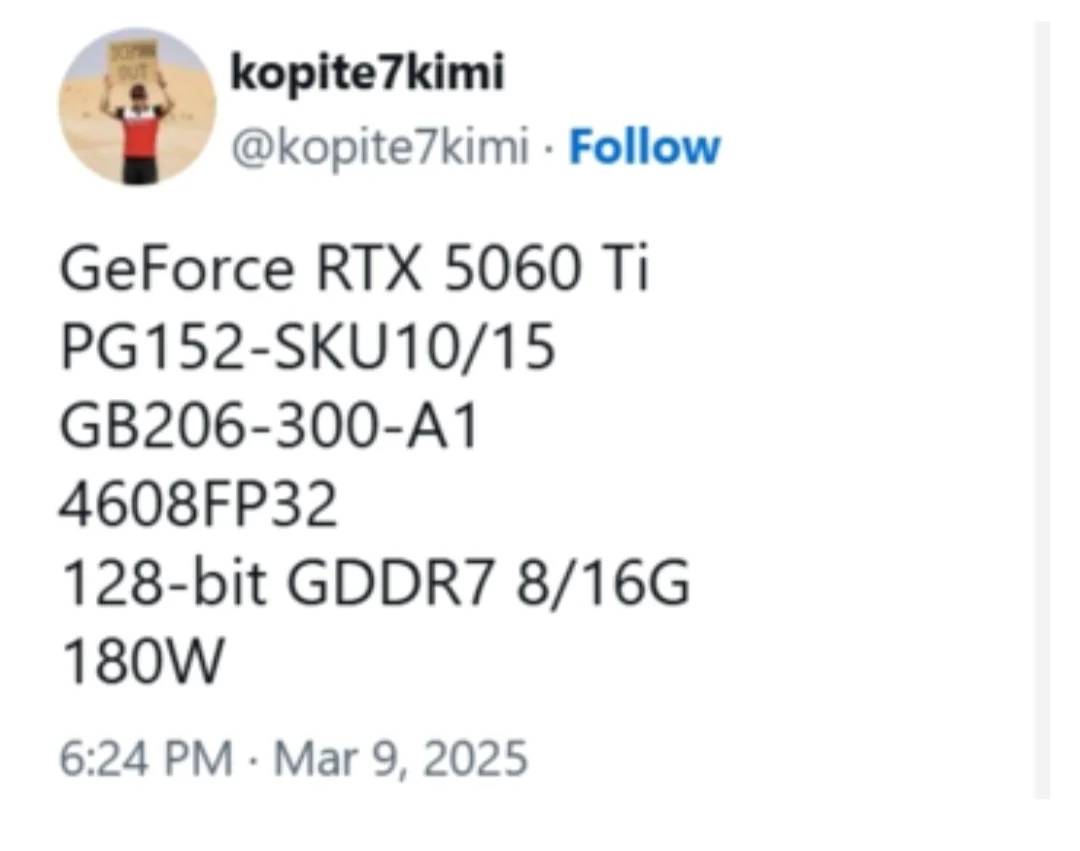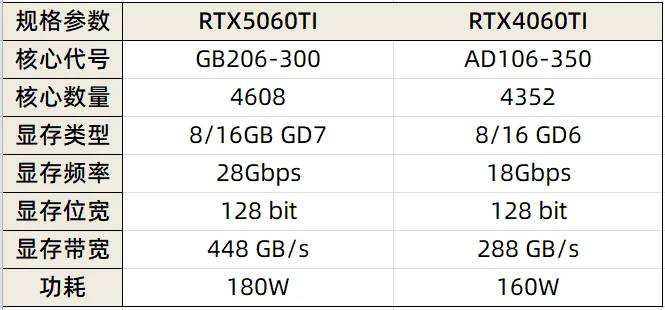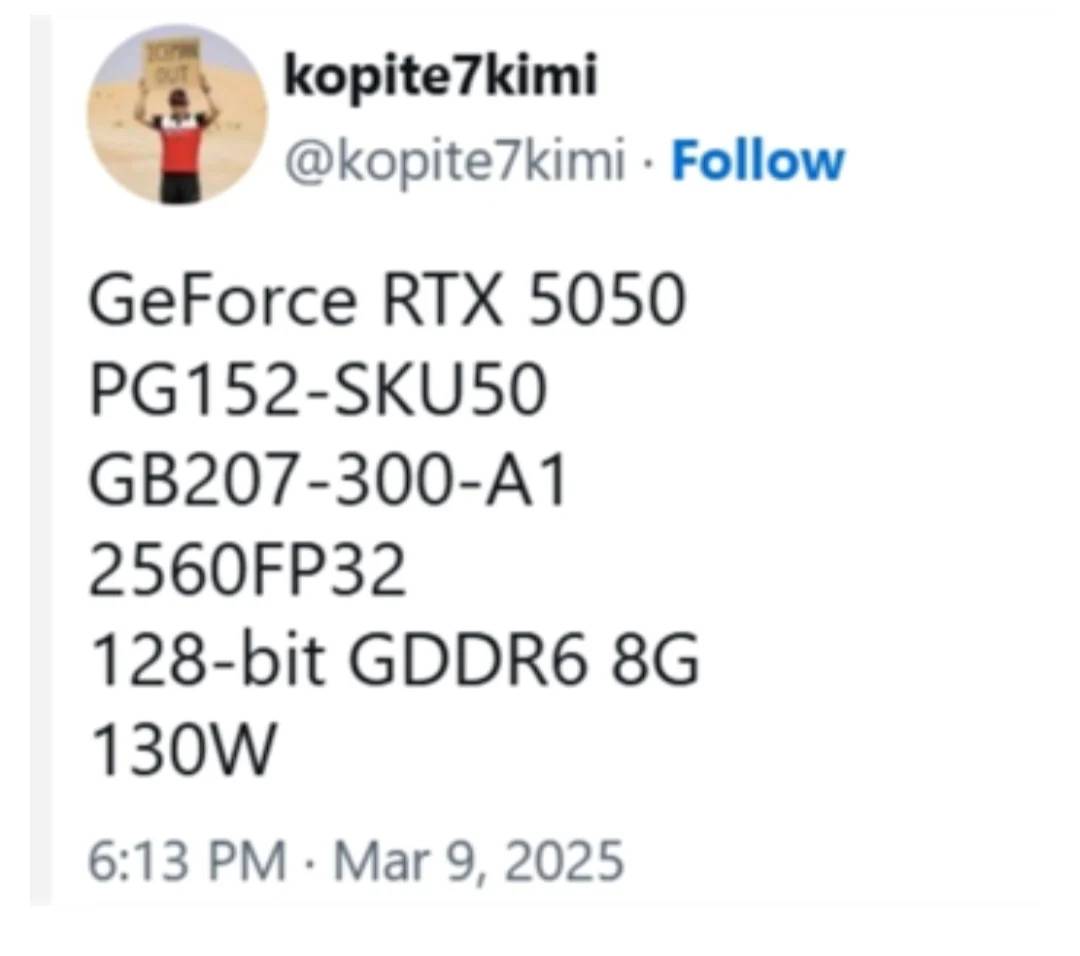Fresh leaks from renowned NVIDIA insider kopite7kimi have surfaced, and I’ve compiled the specifications into this convenient comparison table (Disclaimer: These are preliminary leaks – official specs will serve as the definitive reference).

The leaked data reveals an interesting trend: while the 5060 Ti shows only a modest 6% core count improvement over its 4060 Ti predecessor, its significantly upgraded VRAM promises superior high-resolution performance. However, real-world performance gains might be more incremental than revolutionary.

The real star of these leaks appears to be the standard 5060 model, which is shaping up to be the second most impressive upgrade after the flagship 5090. With a whopping 25% core count boost, this budget-friendly option could potentially rival the performance of the current-gen 4060 Ti.

For PC enthusiasts contemplating their next build or prebuilt purchase, patience might be the winning strategy here. The wait won’t be long – NVIDIA is expected to make official announcements within the next 10 days.

It’s interesting to see how the 5060 Ti is focusing more on VRAM improvements rather than just core count upgrades. I wonder if this will really make a noticeable difference in gaming at lower resolutions too, not just high-end setups. The rumors about release dates are always exciting but can be misleading; I’ll wait for official announcements before getting too hopeful. Overall, it sounds like NVIDIA is taking a strategic approach with these new models.
Absolutely, the focus on VRAM could indeed benefit gamers at lower resolutions by allowing more efficient texture handling and faster load times. It’s true that release date rumors can be hit or miss, so staying patient until the official word is always wise. I think NVIDIA’s strategy makes sense—balancing VRAM and architecture improvements could appeal to both casual and hardcore gamers. Thanks for your insightful comment!
It’s interesting to see the focus on VRAM upgrades rather than just core counts. I wonder how much of an impact that will have on actual gaming performance at higher resolutions, though. The rumors suggest it could be a solid upgrade for 1440p gaming but we’ll have to wait for official benchmarks. Either way, I’m curious to see if these leaks hold up once the cards officially launch.
You’re absolutely right! Focusing on VRAM makes a big difference, especially for high-res gaming like 1440p and beyond. It can help with textures and rendering details, so the performance gains might be more noticeable than just boosting core counts. I agree—official benchmarks will tell the full story, but it sounds promising! Thanks for sharing your thoughts; it’s always exciting to hear what gamers are thinking!
It’s interesting to see the focus on VRAM improvements rather than just core count upgrades. I wonder how these specs will hold up in actual gaming benchmarks compared to previous generations. If the performance gains are only incremental, it might not justify an immediate upgrade for most users. Looking forward to seeing official specs and reviews closer to the release date!
Absolutely agree! VRAM improvements can often have a bigger impact on real-world gaming performance than core count alone. It’ll be fascinating to see if these upgrades deliver noticeable jumps in benchmarks versus prior generations. Either way, waiting for official reviews closer to launch is always wise. Thanks for your insightful comment!
It’s interesting to see the focus on VRAM upgrades rather than just core count improvements. I wonder how these changes will impact power consumption and pricing though—those seem like key factors for gamers. Overall, it sounds like another solid but not groundbreaking update in the series. I’ll definitely keep an eye on official announcements before making any decisions.
Absolutely, VRAM is becoming increasingly important for modern gaming, especially with higher resolutions and ray tracing. You’re right that power consumption and pricing will be crucial considerations—manufacturers always face that balancing act. I agree it sounds like a practical upgrade rather than a game-changer, but those small improvements can make a big difference over time. Thanks for sharing your thoughts; it’s always great to hear perspectives from fellow tech enthusiasts!
It’s interesting to see the focus on VRAM improvements rather than just core count boosts. I wonder how much of an impact this will have on actual gaming performance at 1440p or even 4K, though. The rumored release date seems a bit far off, so I hope these leaks get confirmed soon. It’ll be cool to see if these cards can really deliver on those performance promises.